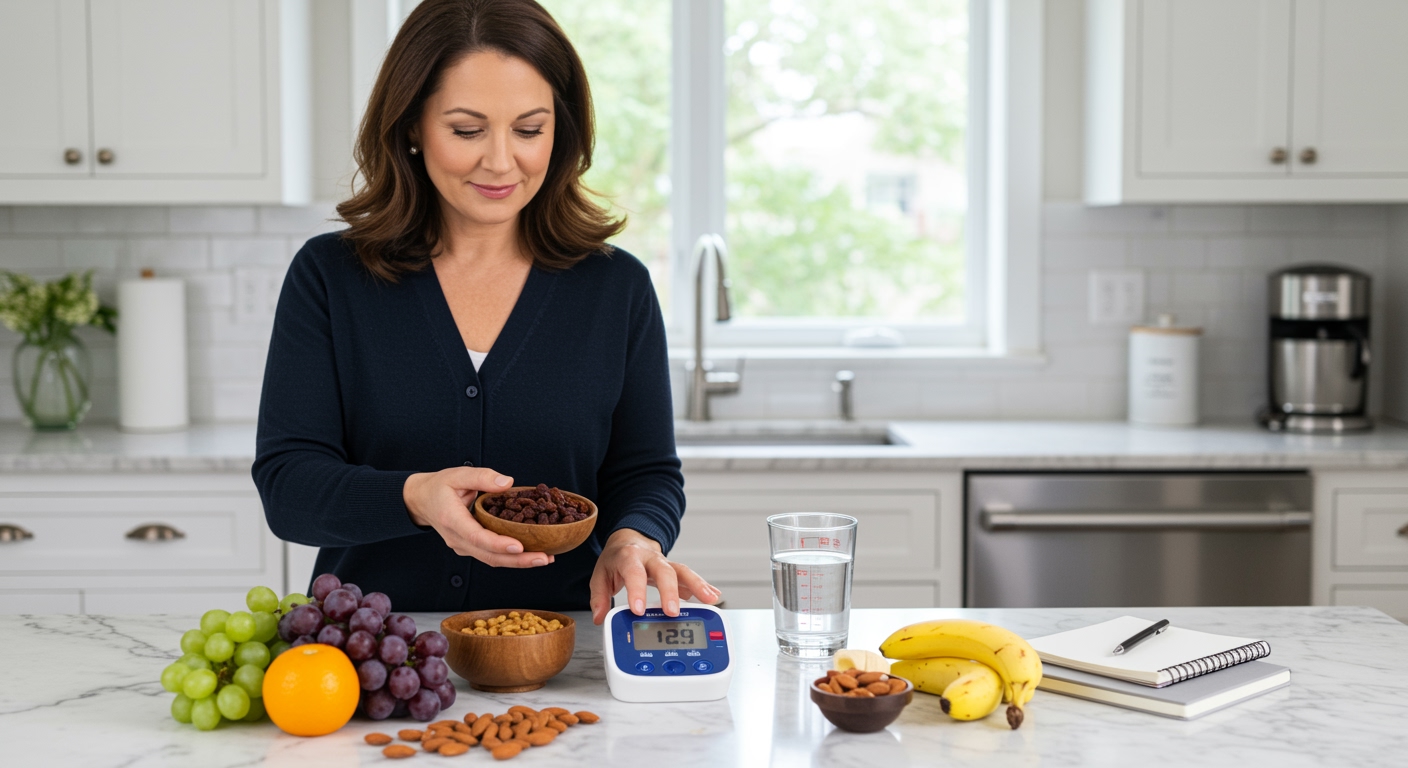✪ Key Takeaway: Raisins can help lower blood pressure due to their high potassium content and natural compounds that support heart health.
Introduction
You grab a handful of raisins as a quick snack and wonder if these sweet, chewy treats are helping or hurting your blood pressure goals.
Many people with high blood pressure avoid raisins because they think the natural sugars will spike their numbers, but recent research suggests the opposite might be true.
Hi, I’m Abdur, your nutrition coach, and today I’m going to explain how raisins actually affect your blood pressure and whether they deserve a place in your heart-healthy diet.
What Makes Raisins Good For Blood Pressure?
Raisins pack a powerful punch of potassium, containing about 320 milligrams per quarter cup serving.
This essential mineral works like a natural blood pressure regulator by helping your kidneys remove excess sodium from your body.
When sodium levels drop, your blood vessels can relax, and the pressure against your artery walls decreases naturally.
Raisins also contain antioxidants called phenolic compounds that protect your blood vessels from damage and inflammation.
These compounds help maintain the flexibility of your arteries, which is crucial for healthy blood flow and pressure regulation.
The fiber content in raisins supports heart health by helping to lower cholesterol levels and improve overall cardiovascular function.
✪ Fact: One quarter cup of raisins provides about 8% of your daily potassium needs.
Does The Sugar In Raisins Raise Blood Pressure?
The natural sugars in raisins do not directly cause blood pressure spikes like processed sugars might.
Raisins contain fructose and glucose bound with fiber, which slows down sugar absorption and prevents rapid blood sugar changes.
Research shows that the potassium benefits in raisins actually outweigh any concerns about their natural sugar content when it comes to blood pressure.
However, portion control remains important because excessive calories from any source can lead to weight gain, which does affect blood pressure.
The key is eating raisins as part of a balanced diet rather than consuming large quantities throughout the day.
Studies indicate that people who eat moderate amounts of raisins regularly show better cardiovascular outcomes compared to those who avoid them entirely.
✪ Pro Tip: Stick to a quarter cup serving of raisins to get benefits without overdoing calories.
How Much Should You Eat Daily?
The optimal daily serving of raisins for blood pressure benefits is one quarter cup, which equals about 40 grams.
This amount provides significant potassium while keeping calories reasonable at approximately 120 calories.
Eating this serving size three times per week can contribute meaningfully to your overall potassium intake without disrupting your daily calorie goals.
You can spread this amount throughout the day by adding a tablespoon to your morning oatmeal, another to your lunch salad, and the rest as an afternoon snack.
Timing matters less than consistency, so choose times that work best with your eating schedule and hunger patterns.
Remember that raisins work best when combined with other heart-healthy foods like nuts, vegetables, and whole grains rather than eaten in isolation.
✪ Note: Always consult your doctor about dietary changes if you take blood pressure medications.
Are Fresh Grapes Better Than Raisins?
Fresh grapes and raisins offer different advantages for blood pressure management, and both can fit into a heart-healthy diet.
Raisins contain concentrated nutrients because the drying process removes water while preserving minerals like potassium and antioxidants.
Fresh grapes provide more volume and water content, which can help with satiety and hydration, both important for blood pressure control.
The calorie density differs significantly, with raisins containing about four times more calories per gram than fresh grapes.
Fresh grapes may be better if you struggle with portion control, while raisins work well if you need a portable snack with concentrated nutrition.
Both forms provide beneficial compounds for heart health, so choose based on your lifestyle, preferences, and overall dietary goals.
✪ Fact: One cup of fresh grapes contains the same potassium as one quarter cup of raisins.
The Bottom Line
Raisins can be a valuable addition to a blood pressure-friendly diet when eaten in appropriate portions.
Smart nutrition means looking beyond single foods to see how they fit into your overall eating pattern, and raisins earn their place through potassium content and heart-protective compounds.
I would love to hear about your experience with raisins and blood pressure management, so please share your questions or thoughts in the comments below.
References
At NutritionCrown, we use quality and credible sources to ensure our content is accurate and trustworthy. Below are the sources referenced in creating this article:
- PubMed: Effects of raisins on blood pressure
- Science Daily: Raisins reduce blood pressure
- California Raisins: Health and nutrition research
- WebMD: Are raisins good for you





